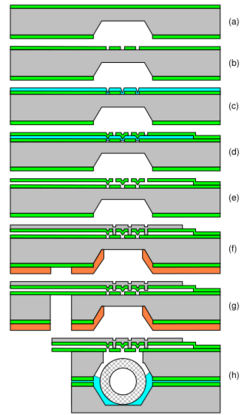Physics:Nanofountain probe
A nanofountain probe (NFP) is a device for 'drawing' micropatterns of liquid chemicals at extremely small resolution. An NFP contains a cantilevered micro-fluidic device terminated in a nanofountain. The embedded microfluidics facilitates rapid and continuous delivery of molecules from the on-chip reservoirs to the fountain tip. When the tip is brought into contact with the substrate, a liquid meniscus forms, providing a path for molecular transport to the substrate. By controlling the geometry of the meniscus through hold time and deposition speed, various inks and biomolecules could be patterned on a surface, with sub 100 nm resolution. File:Nanofountain probe-SEM and Oprtical Image.tif
Historical background
The advent of dip-pen nanolithography (DPN) in recent years represented a revolution in nanoscale patterning technology. With sub-100-nanometer resolution and an architecture conducive to massive parallelization, DPN is capable of producing large arrays of nanoscale features. As such, conventional DPN and other probe-based techniques are generally limited in their rate of deposition and by the need for repeated re-inking during extended patterning.
To address these challenges, nanofountain probe was developed by Espinosa et al. where microchannels were embedded in AFM probes to transport ink or bio-molecules from reservoirs to substrates, realizing continuous writing at the nanoscale.[1] Integration of continuous liquid ink feeding within the NFP facilitates more rapid deposition and eliminates the need for repeated dipping, all while preserving the sub-100-nanometer resolution of DPN.
Microfabrication
Nano fountain probes (NFPs) are fabricated on the wafer-scale using microfabrication techniques allowing for batch fabrication of numerous chips.[2] Through the different generations of devices, design and experimentation improved the device yielding to a robust fabrication process. The highly enhanced feature dimension and shapes is expected to improve the performance in writing and imaging.

Applications
Direct-write nanopatterning
NFP is used in the development of a to scale, direct-write nanomanufacturing platform. The platform is capable of constructing complex, highly-functional nanoscale devices from a diverse suite of materials (e.g., nanoparticles, catalysts (increase rate of reaction), biomolecules, and chemical solutions).[3] Demonstrated nanopatterning capabilities include:
• Biomolecules (proteins, DNA) for biodetection assays or cell adhesion studies
• Functional nanoparticles for drug delivery studies and nanosystems making (fabrication)
• Catalysts for carbon nanotube growth in nanodevice fabrication
• Thiols for directed self-assembly of nanostructures.
Direct in-vitro single-cell injection
Taking advantage of the unique tip geometry of the NFP nanomaterials are directly injected into live cells with minimal invasiveness.[4] This enables unique studies of nanoparticle-mediated delivery, as well as cellular pathways and toxicity. Whereas typical in vitro studies are limited to cell populations, these broadly-applicable tools enable multifaceted interrogation at a truly single cell level.
See also
- Nanolithography
References
- ↑ 1. Kim, K.-H., et al. Massively parallel multi-tip nanoscale write with fluidic capabilities-fountain pen nanolithography (FPN). in Proceedings of the 4th International Symposium on MEMS and Nanotechnology. 2003. Charlotte, North Carolina.
- ↑ Moldovan, N., K.-H. Kim, and H.D. Espinosa, Design and fabrication of a novel microfluidic nanoprobe. Journal of Micromechanical Systems, 2006. 15: p. 204-213.
- ↑ Loh, O.Y., et al., Electric field-induced direct delivery of proteins by a nanofountain probe. Proceedings of the National Academy of Sciences of the United States of America, 2008. 105: p. 16438–43.
- ↑ Loh, O., et al., Nanofountain-probe-based high-resolution patterning and single-cell injection of functionalized nanodiamonds. Small, 2009. 5: p. 1667-1674.
 |
